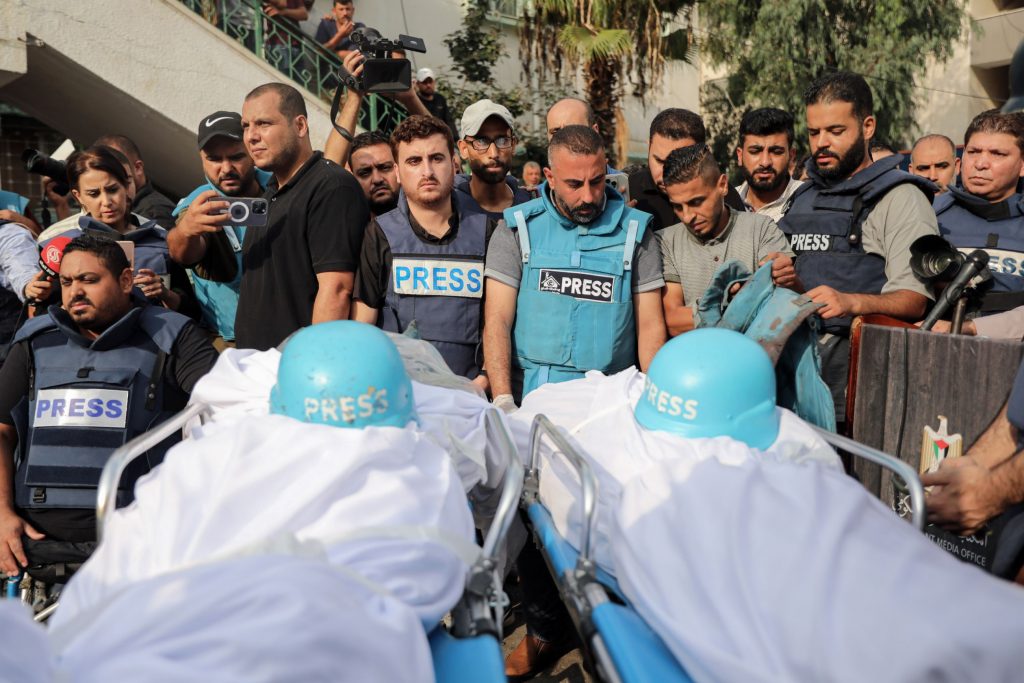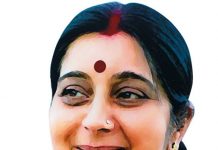
The list of the dead and dying in Gaza seems endless. Doctors and medical staff besides reporters and photo-journalists covering this genocide are constantly getting targeted, injured and killed.
On the just passed by International Day to End Impunity for Crimes against Journalists, on November 2, the scale of violence and assaults that journalists face was highlighted. This scale is particularly shocking in conflict zones, war-torn countries, and definitely in regions like Gaza
The list of the dead and dying in Gaza seems endless. Doctors and medical staff besides journalists, reporters and photo-journalists covering this genocide are constantly getting targeted, injured and killed.
To quote from news reports on the journalists killed in the Gaza stretch, in these recent weeks: At least 37 journalists have been killed since the war began, the Committee to Protect Journalists (CPJ) said…These include 32 Palestinians, four Israelis and one Lebanese. In fact, Al Jazeera’s Gaza bureau chief, Wael Dahdouh lost four members of his own family in Israeli air strikes. His wife Amna, 15-year-old son Mahmoud and seven-year-old daughter Sham were killed, as was his 18-month-old grandson Adam, following directives to leave northern Gaza for the south, only to come under Israel’s bombardment of the Nuseirat refugee camp where they were staying.
“They take revenge on us through our children,” Dahdouh stated upon finding his son’s lifeless body… “What happened is clear. This is a series of targeted attacks on children, women and civilians. I was just reporting from Yarmouk about such an attack, and the Israeli raids have targeted many areas, including Nuseirat…We had our doubts that the Israeli occupation would not let these people go without punishing them. And sadly, that is what happened. This is the ‘safe’ area that the occupation army spoke of.”
And November 5 strike on the home of journalist Mohammad Abu Hassir of Wafa News Agency, killed him and his 42 family members.And the Reuters journalist Issam Abdallah was standing near the Lebanon-Israeli border on October 13 when he was killed by a missile strike. Reuters journalists Thaer Al-Sudani and Maher Nazeh sustained injuries in the blast. Two AFP journalists, Christina Assi and Dylan Collins, were also injured…the list of the dead and injured and targeted and assaulted journalists is indeed long and perhaps ongoing. A tragic reality of these barbaric times we are living in, when anyone can be attacked and killed.
And to quote from The Wire news report: ‘Journalists from the United States have issued a statement of condemnation against “Israel’s killing of journalists in Gaza” and appealed to newsrooms in the West to uphold “integrity” in covering Israel’s atrocities against Palestinians. The statement of condemnation, which was first brought out on November 6, was signed by 1,265 reporters, editors, photographers, producers, and other workers in newsrooms around the world at the last count…It also condemned the biased coverage of the ongoing war and longstanding conflict between Israel and Palestine in the Western media. “We also hold Western newsrooms accountable for dehumanising rhetoric that has served to justify the ethnic cleansing of Palestinians. Double standards, inaccuracies and fallacies abound in American publications and have been well documented.” it added.
And with this scale of violence and attacks and assaults, can the writers and poets be left intact in Gaza! The leading poet of Palestine, Mosab Abu Toha, was detained in a mass arrest by the Israeli Defence Forces on 20 November, 2023. He was reportedly at a checkpoint in Gaza, travelling towards the Rafah border crossing, with his wife and children. Later came in the news reports stating that he was finally released by the IDF after being “interrogated and beaten.”
To quote from the Literary Hub, “On October 29, 2023, Abu Toha posted an Instagram video of his family home, now flattened and reduced to rubble, in Beit Lahiya, North Gaza. “That used to be my house,” he says, looking over his shoulder. “There is nothing, there is nothing over there. Not my books. Not my heirlooms. Not the kitchen. Nothing.”…Later that day, Abu Toha posted a screenshot of the poem “What Is Home?” from his debut poetry collection Things You May Find Hidden In My Ear published last year by City Lights. In the caption to the poem, he asks: “Please save this poem, recite to the people around you and tell them what happened to my home, and the homes of so many other people? Tell them some families were buried under the rubble?”
Ending this column with Mosab Abu Toha’s verse: What is Home?, from the Literary Hub:
‘What is Home?
What is home:/
It is the shade of trees on my way to school before they were uprooted./
It is my grandparents’ black-and-white wedding photo before the walls
crumbled./
It is my uncle’s prayer rug, where dozens of ants slept on wintry nights, before it was looted and/
put in a museum./
It is the oven my mother used to bake bread and roast chicken before a bomb reduced our/
house to ashes./
It is the café where I watched football matches and played –/
My child stops me: Can a four-letter word hold all of these?/’













